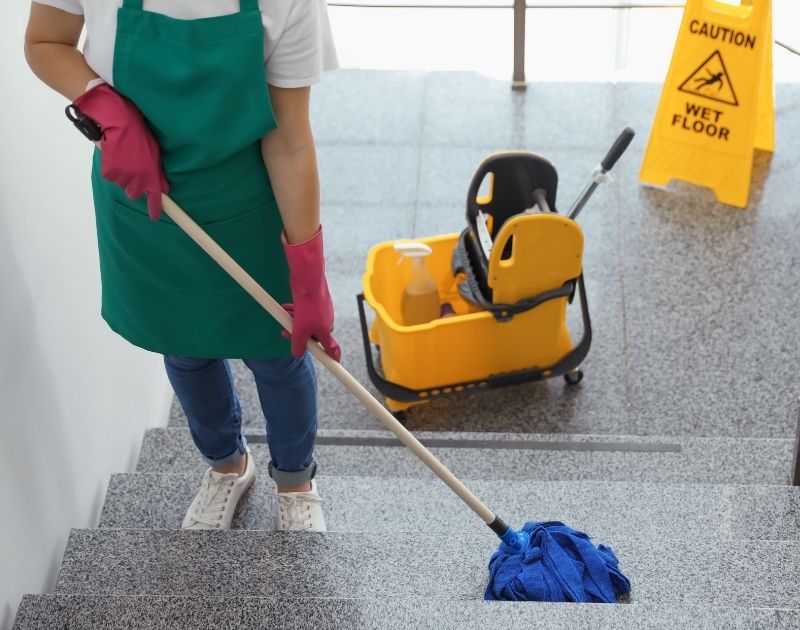Sustainability has moved far beyond a buzzword. For businesses across the United States, it is now a core expectation—something customers, employees, and even building inspectors look for as a measure of professionalism and responsibility. And nowhere is the impact of this shift more evident than in the cleaning industry.
Commercial properties today want cleaning partners who can help them reduce chemical exposure, lower environmental impact, and create healthier, safer workplaces. As a result, forward-thinking companies are re-evaluating how they clean, what they clean with, and who they trust to maintain their facilities.
At the forefront of this change are providers like Assett Commercial Services, a leader in Commercial Cleaning Services and Janitorial Services that has embraced environmentally responsible practices without compromising quality or results. For facilities directors, office managers, and property managers, understanding what’s driving this shift can help you make smarter decisions for your buildings—and position your organization as a steward of both health and the environment.
Below, we dive deep into why sustainability is reshaping the cleaning industry, the trends driving the change, and how businesses can benefit from partnering with a sustainability-focused cleaning provider.
The New Standard: Why Sustainability Matters to Modern Facilities
A decade ago, green cleaning was considered optional—something only a handful of organizations prioritized. Today, it’s a baseline expectation across almost every sector. Several key forces are behind this transformation:
1. Employees Expect Healthier Workplaces
Employee health and wellness initiatives have become central to workplace culture. Workers want to know that their office or facility is clean, safe, and free from unnecessary chemical exposure. Sustainable cleaning supports:
-
Better indoor air quality
-
Reduced allergens
-
Lower VOC (volatile organic compounds) levels
-
Fewer irritants commonly found in traditional cleaning formulas
With many companies focusing on employee retention, implementing responsible cleaning practices is no longer optional—it’s strategic.
2. Customers Care About Environmental Footprints
Clients and customers notice more than ever how companies operate. For building owners, landlords, medical offices, schools, and corporate campuses, demonstrating a commitment to sustainability sends a strong message:
“You operate responsibly, and you value long-term impact.”
Commercial tenants increasingly look for buildings that offer environmentally friendly services—including cleaning. When you can tell tenants your building partners with an eco-conscious cleaning provider, it becomes a competitive advantage.
3. Regulations and Certifications Are Pushing Higher Standards
Environmental regulations—federal, state, and local—continue to evolve. Industries with strict compliance requirements, like healthcare, education, food service, and manufacturing, must meet higher standards in:
-
Chemical storage
-
Waste disposal
-
Equipment maintenance
-
Air quality
-
Facility hygiene
Furthermore, green building certifications—LEED, WELL Building Standard, Fitwel, and others—require sustainability-aligned cleaning methods. A facility’s ability to achieve certification often depends on cleaning practices.
4. Corporate Sustainability Initiatives Are Expanding
Many organizations have adopted sustainability goals, including:
-
Environmental, Social & Governance (ESG) reporting
-
Carbon reduction efforts
-
Sustainable purchasing policies
-
Green operations initiatives
Cleaning services now play a measurable role in these commitments. Choosing a sustainable cleaning partner helps organizations meet their ESG goals and demonstrate responsible stewardship.
How Sustainability Is Transforming Cleaning Methods and Products
As sustainability becomes a priority, the cleaning industry is evolving in several major ways.
1. The Shift Toward Environmentally Responsible Chemicals
Traditional cleaning chemicals often include:
-
Harsh acids
-
Bleaches
-
High-VOC formulas
-
Synthetic fragrances
-
Petroleum-based solvents
These products can irritate the skin, trigger respiratory issues, and harm the environment during disposal.
Modern sustainable cleaning emphasizes chemicals that are:
-
Biodegradable
-
Non-toxic
-
Low-VOC
-
Free from harsh residues
-
Safe for employees, clients, and building occupants
At Assett Commercial Services, the focus is always on using effective, compliant, and environmentally friendly cleaning agents. Facilities never need to sacrifice cleanliness for sustainability.
2. Microfiber and Reusable Systems Reduce Waste
Microfiber materials drastically reduce the need for disposable wipes, paper products, and excess chemical usage. Their benefits include:
-
Capturing more dust and bacteria
-
Reducing cross-contamination
-
Lowering waste volume
-
Enhancing cleaning efficiency
Sustainability-driven cleaning companies rely heavily on microfiber systems to deliver better results while cutting environmental impact.
3. High-Efficiency Cleaning Equipment
Equipment has undergone major sustainability upgrades. For example:
-
HEPA-filtered vacuums improve indoor air quality
-
Low-moisture carpet cleaners reduce water use
-
Energy-efficient floor scrubbers lower electricity consumption
-
Electrostatic sprayers ensure efficient disinfectant application
These tools produce superior results while minimizing resource usage.
4. Water Reduction Techniques
Traditional cleaning methods often require excessive water usage. Sustainable cleaning practices use:
-
Controlled dilution systems
-
Low-water floor cleaning machines
-
Efficient mop and bucket systems
-
Water-smart pressure washing techniques
Buildings save water—an increasingly important priority in many regions.
5. Sustainable Waste Management Practices
Green cleaning includes responsible waste practices such as:
-
Recycling programs
-
Composting initiatives
-
Safe chemical disposal
-
Reduction of single-use plastics
When your cleaning provider takes an active role in waste reduction, your organization benefits both environmentally and financially.
Sustainable Cleaning Is Not Just Eco-Friendly—It’s Cost-Effective
Many organizations assume sustainability costs more. In reality, the opposite is often true.
Here’s how sustainability reduces long-term cost:
1. Lower Chemical Consumption
Green cleaning products typically use concentrated formulas with dilution systems, preventing waste and reducing overall consumption.
2. Longer-Lasting Equipment
High-efficiency equipment reduces wear and requires fewer repairs, lowering maintenance expenses.
3. Reduced Employee Absenteeism
Cleaner air, fewer irritants, and healthier workplaces can lead to:
-
Fewer sick days
-
Higher productivity
-
Improved well-being
This creates direct financial value for employers.
4. Improved Asset Protection
Facilities that rely on responsible cleaning practices experience:
-
Fewer floor refinishing costs
-
Less furniture damage
-
Longer carpet lifespans
-
Better HVAC performance due to reduced dust
Responsible cleaning isn’t just green—it’s smart business.
Industries Most Impacted by Sustainable Cleaning Trends
While sustainability affects all businesses, some industries feel the impact more strongly.
1. Healthcare and Medical Facilities
Sustainability must be balanced with strict sanitization and infection control requirements. Healthcare partners rely on cleaning companies that can provide:
-
Non-toxic disinfectants
-
Low-VOC products
-
Specialized medical-grade cleaning methods
Assett Commercial Services supports healthcare facilities with compliance-focused Janitorial Services that respect both safety and sustainability.
2. Schools and Educational Campuses
Parents and educators are increasingly concerned about chemical exposure. Green cleaning reduces risks for children, staff, and teachers, creating safer learning environments.
3. Corporate Offices
Sustainability influences tenant decisions, employee health initiatives, and ESG reporting. Office owners benefit from green cleaning programs that support wellness and energy savings.
4. Manufacturing, Warehouses, and Industrial Facilities
These facilities generate dust, debris, and contaminants at higher levels. Sustainable cleaning helps maintain indoor air standards without introducing unnecessary chemicals.
5. Government Buildings and Public Facilities
Many government agencies have mandated sustainability goals—including specific requirements for eco-friendly cleaning practices.
6. Retail Stores
Customer perception plays a major role in retail success. Eco-friendly cleaning boosts brand reputation and enhances customer loyalty.
Why More Organizations Are Switching to Sustainable Cleaning Providers
Commercial cleaning companies that prioritize sustainable products and processes offer several advantages:
1. Healthier Indoor Environments
Cleaner air, fewer irritants, safer chemicals.
2. Improved Building Appearance and Longevity
Sustainability often leads to better, more consistent results.
3. Reduced Environmental Impact
Less waste, lower emissions, fewer harmful chemicals.
4. Greater Compliance and Risk Reduction
Sustainable providers understand:
-
OSHA standards
-
EPA guidelines
-
State and local environmental regulations
-
Certification requirements
5. Better Support for Corporate Sustainability Goals
Cleaning becomes part of a company’s larger environmental strategy.
6. A More Trusted Partnership
Buildings want cleaning companies that take their work seriously—and sustainability is a powerful indicator of long-term commitment and professionalism.
Why Assett Commercial Services Leads the Way in Sustainable Commercial Cleaning
While many cleaning companies claim to be “green,” the reality is that sustainability must be built into the entire operation—not just the products used.
Assett Commercial Services incorporates sustainability into every part of our Commercial Cleaning Services and Janitorial Services, including:
1. Responsible Chemical Selection
Using cleaning agents that are safe, effective, and environmentally conscious—without compromising sanitation or compliance.
2. High-Efficiency Equipment
All equipment is chosen to reduce waste, conserve energy, and enhance cleaning quality.
3. Microfiber-Driven Cleaning
We rely on modern microfiber systems to significantly reduce water usage, improve sanitization, and minimize cross-contamination.
4. Reduced Waste Practices
We take proactive steps to lessen the environmental impact of cleaning operations, from recycling to chemical dilution management.
5. Compliance-Aligned Processes
Assett follows the guidelines established by OSHA, EPA, CDC, and industry-specific regulatory bodies. Sustainable cleaning should never compromise safety—and with Assett, it never does.
6. Tailored Solutions for Every Facility
No two buildings are alike. Assett crafts custom cleaning programs that blend sustainability, efficiency, and cost savings for maximum value.
If your business is working toward sustainability goals, prioritizing employee health, or seeking a more responsible approach to facility maintenance, Assett Commercial Services is the partner that aligns with your mission.
The Future of Sustainable Cleaning: What Businesses Should Expect Next
The cleaning industry is evolving rapidly—and sustainability will continue to shape its future.
1. More Eco-Certified Products
Expect products to carry labels like:
-
Green Seal
-
Safer Choice
-
EcoLogo
These certifications help facilities verify product safety and environmental responsibility.
2. Data-Driven Cleaning
Technology will play a larger role, using smart systems to track:
-
Chemical usage
-
Equipment efficiency
-
Air quality
-
Energy consumption
This creates transparency and verifies sustainable outcomes.
3. Reduced Water and Energy Usage
Innovative equipment continues to mature, offering more sustainable cleaning with fewer resources.
4. Increased Regulatory Pressure
As environmental standards tighten, cleaning providers must stay ahead of compliance—and businesses must choose partners who can adapt.
5. Growing Corporate Accountability
ESG reporting is becoming mainstream. Cleaning programs will play a measurable role in environmental responsibility and workforce health.
Your Facility Deserves a Cleaning Partner Committed to Sustainability
Sustainability is no longer optional in the cleaning industry—it’s a driving force reshaping how buildings are cleaned, how chemicals are used, and how cleaning companies operate. Organizations that embrace this shift gain healthier workplaces, stronger reputations, lower long-term costs, and a reduced environmental footprint.
Assett Commercial Services is proud to lead the way with sustainability-focused Commercial Cleaning Services and Janitorial Services designed for offices, medical facilities, industrial buildings, educational institutions, and more.
If you’re ready to elevate your facility with a responsible, high-quality cleaning partner, we invite you to connect with us today.
Discover how Assett can create a healthier, more sustainable future for your building.




